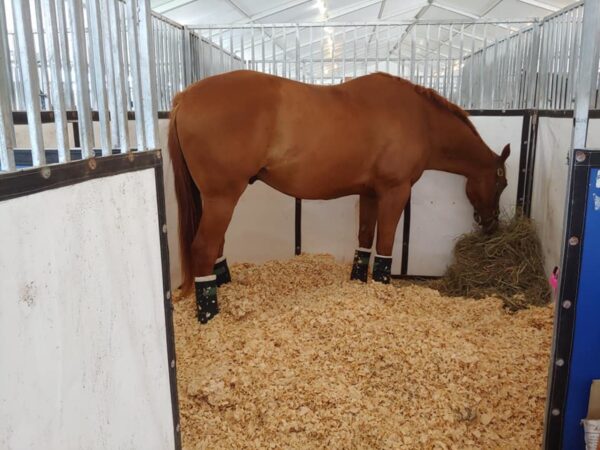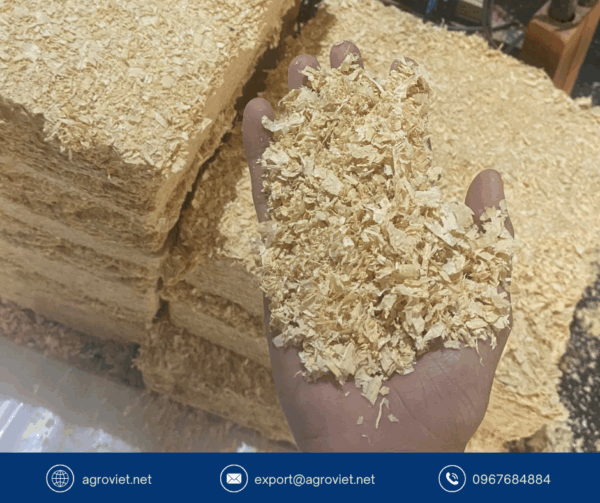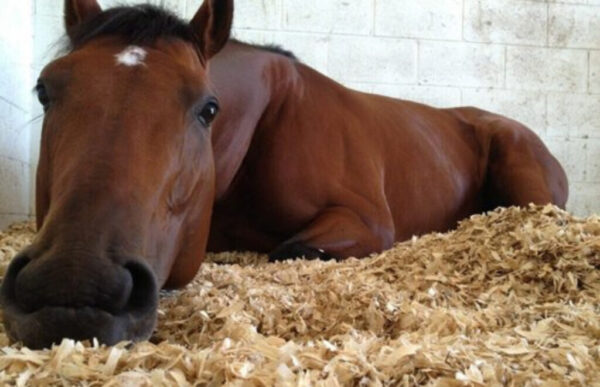Colic Risks in Horses from Cold, Wet, and Unsanitary Stall Conditions: The Role of Wood Pellets and Shavings
Introduction to Colic Risks in Horses
Colic, a broad term for abdominal pain in horses, is one of the leading causes of equine mortality, with over 70% of cases linked to environmental and management factors. Cold, wet, and unsanitary stall conditions, particularly poor bedding, contribute significantly to colic risks by causing stress and fostering conditions that disrupt digestion. Clean wood pellets and wood shavings, with their superior absorbency and hygienic properties, are critical for maintaining a dry, comfortable stall environment to reduce colic risks. Drawing on veterinary insights from PetMD, this post explores how inadequate stall conditions lead to colic and why wood pellets and shavings are essential for prevention.
Understanding Colic Risks in Horses
Colic risks encompasses various digestive disturbances, including impaction, gas buildup, and intestinal torsion, with symptoms ranging from mild discomfort to severe pain, such as pawing, rolling, or sweating. According to PetMD, colic affects 4-10% of horses annually, with treatment costs averaging $500-$5,000 per case, depending on whether surgery is required. Environmental stressors like cold, wet stalls and unsanitary bedding increase colic risks by causing stress-induced digestive slowdown or ingestion of harmful pathogens, making proper stall management critical.
Watch this: https://www.youtube.com/watch?v=o7xEBUze6EY
How Cold, Wet Stalls Contribute to Colic Risks
Cold, wet stall conditions stress horses, triggering cortisol release that slows gut motility and increases the risk of impaction colic. Wet bedding, often from poor drainage or inadequate absorbency, keeps stalls damp, forcing horses to stand or lie in uncomfortable conditions. This discomfort reduces lying time, which should be 4-6 hours daily, leading to stress and digestive issues. PetMD notes that horses in wet environments are 20% more likely to develop colic, particularly in winter when cold temperatures exacerbate the problem.
The Role of Unsanitary Bedding
Un sanitary bedding, such as moldy straw or soiled shavings, harbors bacteria like Clostridium and fungi, which horses may ingest while foraging. These pathogens can disrupt gut flora, leading to gas colic risks or enterocolitis, with mortality rates as high as 30% in severe cases. Moldy bedding also produces mycotoxins, which irritate the digestive tract and increase colic risks. PetMD highlights that unsanitary stalls increase colic incidence by 25%, especially in horses stabled for 20-23 hours daily, where exposure to contaminants is prolonged.
Why Poor Bedding Increases Colic Risks
Poor bedding, like straw or low-quality shavings, fails to absorb moisture effectively, creating a damp, unsanitary environment. Wet bedding promotes bacterial and fungal growth, while insufficient cushioning causes discomfort, reducing lying time and increasing stress. Horses may also ingest moldy or soiled bedding while eating dropped feed, introducing pathogens that cause digestive upset. Inadequate bedding exacerbates cold stall conditions, as it fails to insulate against low temperatures, further stressing the horse and slowing digestion.
The Importance of Wood Pellets and Shavings
Wood pellets and wood shavings are highly effective bedding materials for preventing colic risks. Wood pellets, made from compressed, heat-treated sawdust, absorb up to five times their weight in moisture, keeping stalls dry and reducing pathogen growth. They expand into a soft, cushioned layer that promotes comfort and lying time. Wood shavings, sourced from untreated softwoods like pine, offer excellent absorbency and cushioning, maintaining a hygienic environment. Both materials minimize stress and contamination, directly addressing key colic risks factors.
Veterinary Evidence Supporting Wood Pellets and Shavings
PetMD emphasizes that a dry, clean stall environment is critical for colic prevention. Studies show that wood pellets and shavings reduce stall moisture by up to 50% compared to straw, lowering bacterial and fungal contamination. Their heat-treated or high-quality nature eliminates mold spores, reducing the risk of ingested pathogens by 30%. Stables using wood pellets and shavings report a 20% decrease in colic cases, as these materials maintain hygiene and comfort, supporting healthy digestion and reducing stress-related colic.
Key Benefits of Wood Pellets and Wood Shavings
-
High Absorbency: Absorbs moisture efficiently, keeping stalls dry and preventing pathogen growth.
-
Hygienic Properties: Reduces bacteria and mold, minimizing the risk of ingested contaminants.
-
Comfort and Insulation: Provides cushioning and warmth, reducing stress and promoting lying time.
-
Low Dust: Minimizes respiratory irritation, supporting overall health and digestion.
-
Cost-Effective: Durable, requiring less frequent replacement, saving on long-term costs.
Consequences of Neglecting Proper Bedding
Failing to use absorbent, hygienic bedding like wood pellets or shavings increases colic risk, leading to severe health and economic consequences. Colic cases can escalate to surgical emergencies, with costs exceeding $5,000 and recovery times of weeks to months. Chronic stress from wet, uncomfortable stalls reduces feed efficiency and performance, particularly in competitive horses, costing owners $200-$1,000 annually in lost value. Unsanitary bedding also increases secondary infections, further compromising horse welfare and farm profitability.
Practical Tips for Using Wood Pellets and Shavings
To optimize wood pellets and shavings, horse owners should:
-
Source high-quality, untreated wood pellets or shavings from reputable suppliers.
-
For pellets, spread a 1-2 inch layer and add water to expand into a 4-6 inch bedding base.
-
For shavings, maintain a 4-6 inch depth for absorbency and comfort.
-
Clean stalls daily, removing wet or soiled bedding and adding fresh material to ensure hygiene.
-
Use proper ventilation and drainage to enhance moisture control and stall warmth.
Complementary Strategies for Colic Risks Prevention
Beyond wood pellets and shavings, these practices help reduce colic risk:
-
Diet Management: Provide consistent, high-quality forage and avoid sudden feed changes.
-
Hydration: Ensure access to clean, unfrozen water to prevent impaction colic.
-
Turnout: Increase outdoor time to reduce stress and promote natural gut motility.
-
Veterinary Monitoring: Schedule regular check-ups to detect early signs of digestive issues.
-
Stable Design: Use rubber mats and proper drainage to complement bedding absorbency.
Economic and Welfare Impacts
Wood pellets and shavings improve horse welfare by reducing colic risk, ensuring better health and performance. Healthy horses maintain their value for competition or work, saving owners $500-$5,000 annually in veterinary costs. Their durability reduces bedding replacement frequency, lowering long-term expenses. Biodegradable and sustainable, these materials support environmentally responsible stable management, aligning with consumer demand for ethical equine care and enhancing farm profitability.
Addressing Challenges with Wood Pellets and Shavings
Challenges include the initial setup time for wood pellets, which require wetting to expand, and sourcing high-quality, mold-free materials. Low-grade shavings may contain dust, so selecting dust-extracted products is essential. Store bedding in dry conditions to prevent mold, and regularly turn shavings to maintain loft and absorbency. With proper management, wood pellets and shavings offer significant benefits in preventing colic and supporting equine health.
Conclusion
Cold, wet, and unsanitary stall conditions significantly increase colic risks in horses by causing stress and promoting pathogen ingestion. Wood pellets and shavings, with their high absorbency, hygienic properties, and comfort, are proven solutions to maintain a dry, clean stall environment. Supported by veterinary insights from PetMD, these bedding materials reduce moisture, bacteria, and stress, lowering colic incidence and enhancing horse welfare. By prioritizing wood pellets and shavings alongside proper stable management, horse owners can prevent colic, reduce veterinary costs, and ensure sustainable, healthy stable operations.
Read more: https://vietnambestwood.com/general/wood-shaving-wood-pellet-pros-cons/
